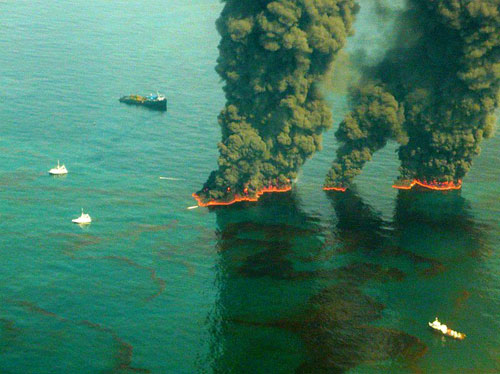![]()
by Catherine Hollingsworth

Clouds of smoke billow up from controlled burns taking place in the Gulf of Mexico.
Anchorage Daily News reported this week that workers cleaning up the Gulf oil spill are getting sick from the exposure and handling of the toxic mess. A call to open emergency clinics to treat these injured workers, or even that anyone is getting harmed, got no mention in the President’s latest brief on progress in the Gulf. Shameful oversight, or deliberate cover-up?
For some Alaskans, this is not surprising. If you have read Alison Johnson’s excellent book Amputated Lives, you know the stories of some of those in Alaska who worked on the Exxon Valdez disaster, getting Multiple Chemical Sensitivities (MCS), or even dying, as a result of cleaning up an oil spill. Still, this risk to health gets less attention than the birds or turtles that are dying as a result of oil spills. Isn’t all life important, especially human life? Why then do our public officials refuse to discuss the injured workers; worse still, continue to harm more by continuing to suppress information about MCS and the potential for genetic and toxic harm to humans? Uninformed workers have been allowed to clean up the Gulf oil spill without protective gear, or in some cases, even a pair of gloves.
Clinics need funding. BP has still not responded to the request for such monies, even though workers are ill and waiting for medical help. U.S. experts on toxic petrochemical injury and MCS, are available to help, but these same experts may not even be asked to assist in this effort to staff the emergency response clinics, since the CDC and the AMA do not want the public to know that science has already shown MCS is a real, toxic-induced illness, or that several epidemiology studies have shown that over 12.5% of the U.S. population have already been diagnosed with MCS. The very same petroleum companies that foul our oceans lobby to keep this quiet.
Those who suffer with MCS know that these injured workers may wait for years, or even their whole lives, for this needed funding, medical help and validation; while running furtively from doctor to doctor seeking something to gain back their lives, exhausting their own finances in the process. For those already diagnosed with MCS, it often took years to find a doctor who knew what was wrong with them, and many lost careers and relationships in the process. For those who suffer with this disabling toxic-induced, inflammatory illness called MCS, watching these oil workers become ill because of a continuing effort to suppress the facts about chemical harm and MCS is intolerable and inexcusable. BP must be responsible for the medical bills of all injured workers and our Government, the CDC and the NIH must finally educate the public about MCS. To do less in this moment of environmental crisis, is an act of deliberate and unconscionable cruelty to anyone working in the Gulf.
As we saw with the Alaskan injured workers, the justice system often blocks them from getting money or assistance until all appeals are settled. Even then legal fees get paid first. Or as in the case of those injured at Ground Zero after 9-11, the claims get thrown out due to the large portion of a settlement which will go to the lawyers – leaving the injured without anything, once more. Sadly, Toxic Tort cases are difficult to file and rarely get to court. Injured workers find that Workman’s comp cases are rarely, if ever, settled in favor of someone injured due to toxic harm; and those avenues exhaust the complainant until they become frustrated enough to drop the suit, or in many cases, even take their own lives. BP must be held financially accountable for injuries to all Gulf workers who might get MCS and toxic injury. Appeals should not be allowed in the courts, since real people’s lives are priceless at any cost, and we have already paid enough for oil.
©2010 Catherine Hollingsworth
 Catherine Hollingsworth is an interior designer, artist, knitting designer, educator and columnist, poet, writer, and MCS activist and advocate. A supporter of alternative energy for many years, she was the owner of an experimental HUD Cycle V passive-hybrid solar home in 1979, and was an engineering assistant on the hydrogen fuel cell at Los Alamos National Labs in 1983. Catherine currently lives in Anchorage, Alaska and leads the Alaska MCS Association and support group.
Catherine Hollingsworth is an interior designer, artist, knitting designer, educator and columnist, poet, writer, and MCS activist and advocate. A supporter of alternative energy for many years, she was the owner of an experimental HUD Cycle V passive-hybrid solar home in 1979, and was an engineering assistant on the hydrogen fuel cell at Los Alamos National Labs in 1983. Catherine currently lives in Anchorage, Alaska and leads the Alaska MCS Association and support group.










0 Comments